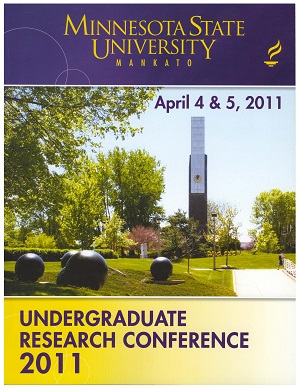Morphological Characterization of Transgenic Mice Hearts
Location
CSU 253/4/5
Start Date
4-4-2011 1:30 PM
End Date
4-4-2011 3:00 PM
Student's Major
Biological Sciences
Student's College
Science, Engineering and Technology
Mentor's Name
Marilyn Hart
Mentor's Department
Biological Sciences
Mentor's College
Science, Engineering and Technology
Second Mentor's Name
Michael Bentley
Second Mentor's Department
Biological Sciences
Second Mentor's College
Science, Engineering and Technology
Description
The heart is a specialized muscle found in all animals with a circulatory system that is responsible for pumping blood throughout blood vessels by rhythmic contractions. The vertebrate heart is composed of myofibrils which maintain a precise alignment of two major components, actin and myosin. The ends of actin filaments are attached to a structural anchor, the Z line, that maintains the alignment of the thin filament. Biochemical and cell biological studies suggest that actin capping (CP) attaches one end of the actin filament to the Z line. In previous studies, mice with reduced expression of CP had major structural defects in muscle unit organization, leading to an enlarged heart and ensuing lethality. To determine the basis of the myofibril defect, we examined the hearts of transgenic and wildtype mice using scanning electron microscopy. The myocardium in both transgenic and wildtype mice were removed and fixed in 2.5% glutaraldehyde. The hearts were cut down the septum, and the right and left ventricles were treated with 1% elastase, 1% collagenase, or both 1% elastase/1% collagenase. The prepared tissue was freeze dried, sputter coated with gold, and visualized using a scanning electron microscope. Digital images were captured and analyzed for alterations in myofibril organization. The genetically altered myocardium displayed disarray relative to their wild type counterparts.
Morphological Characterization of Transgenic Mice Hearts
CSU 253/4/5
The heart is a specialized muscle found in all animals with a circulatory system that is responsible for pumping blood throughout blood vessels by rhythmic contractions. The vertebrate heart is composed of myofibrils which maintain a precise alignment of two major components, actin and myosin. The ends of actin filaments are attached to a structural anchor, the Z line, that maintains the alignment of the thin filament. Biochemical and cell biological studies suggest that actin capping (CP) attaches one end of the actin filament to the Z line. In previous studies, mice with reduced expression of CP had major structural defects in muscle unit organization, leading to an enlarged heart and ensuing lethality. To determine the basis of the myofibril defect, we examined the hearts of transgenic and wildtype mice using scanning electron microscopy. The myocardium in both transgenic and wildtype mice were removed and fixed in 2.5% glutaraldehyde. The hearts were cut down the septum, and the right and left ventricles were treated with 1% elastase, 1% collagenase, or both 1% elastase/1% collagenase. The prepared tissue was freeze dried, sputter coated with gold, and visualized using a scanning electron microscope. Digital images were captured and analyzed for alterations in myofibril organization. The genetically altered myocardium displayed disarray relative to their wild type counterparts.
Recommended Citation
Anderst, Derek and Jennifer Heibel. "Morphological Characterization of Transgenic Mice Hearts." Undergraduate Research Symposium, Mankato, MN, April 4, 2011.
https://cornerstone.lib.mnsu.edu/urs/2011/poster-session-C/1




